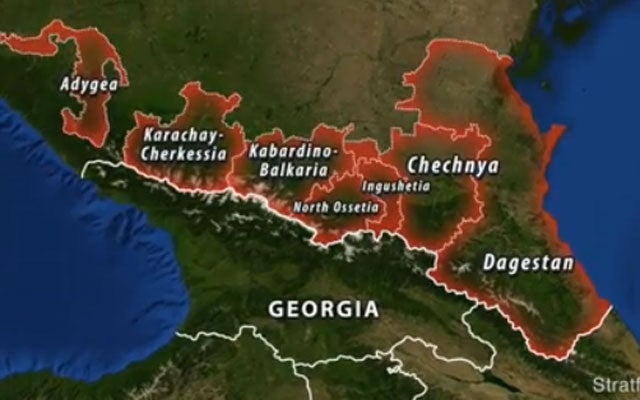The North Caucasus has emerged as an ungovernable safe haven for terrorists, as the government of Russia is at the end of its wits as to how to stem the Islamist insurrection. The brothers who allegedly undertook the Boston Marathon bombing and reportedly planned to hit Times Square in New York, Tamerlan and Dzhokhar Tsarnaev, have roots in this violent region Americans need to know more about.
Since the collapse of the Soviet Union, the mountainous North Caucasus, populated by over 100 ethnic groups, each with its own distinct language, has seen endless conflict. An ongoing counterinsurgency waged against Islamist militants made the area one of the most violent places on earth. Islamist terrorists continue to use the North Caucasus as a safe haven and a battlefield, and the region’s instability represents a threat to U.S. interests as well as to American friends and allies, including Georgia and Azerbaijan.
The region has a long history of interaction with the global Islamist movement, including al-Qaeda. Chechnya, where the brothers’ father is from, has seen visits from top al-Qaeda operatives during the two wars with Russia. Charities that serve as fronts to fund Islamist militants poured considerable support into the region, paying for training, equipment, mosques, and indoctrination. Chechen rebels have fought in Afghanistan—and now in Syria. The State Department designated the most active violent Islamist organization in the North Caucasus, the Caucasus Emirate, as a terrorist group in 2011.
Tamerlan Tsarnaev, who died in a police shootout, became increasingly militant over the past several years, and even visited Dagestan for six months in 2012. There are reports of his contacts with Islamist fighters in Dagestan. Close examination of Tamerlan’s social media activity and interviews with parents suggest behavior and ideology consistent with Islamists in the North Caucasus.
Tamerlan’s YouTube account—which was created shortly after his trip to Russia—contains videos that “hint at a growing radicalization.” In fact, there is more than a hint. The videos promote radical clerics from the North Caucasus and al-Qaeda ideology.
Tamerlan’s younger brother, Dzhokhar, has told investigators that the two have also read al-Qaeda’s English-language magazine Inspire. Further, family members indicated that a new acquaintance of Tamerlan’s, an Armenian convert to Islam known only as “Misha,” further helped to radicalize his beliefs and helped lead him down a violent path.
Ungoverned spaces like the North Caucasus have long been safe havens for Islamists. The recent political unrest has affected the Middle East and Africa. From Afghanistan and Pakistan to Gaza, and from Yemen to the Sahara desert, they breed ignorance, poverty, and terrorism. The semblance of civilization there is gone.
Until the Boston attack, the United States had little involvement in fighting Islamists in the region. This is likely to change.
The U.S. should encourage cooperation with Georgia and Azerbaijan on anti-terrorism and border control operations. Washington can also encourage Europeans to track those from the region who may represent a terrorist threat.
The U.S. government should demand that Middle Eastern governments stop their nationals from financing international terrorism. Finally, the U.S. should engage Russia, when needed, to improve cooperation against a common threat.
Benjamin Tigay is currently a member of the Young Leaders Program at The Heritage Foundation. For more information on interning at Heritage, please click here.































